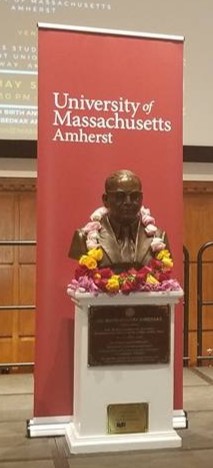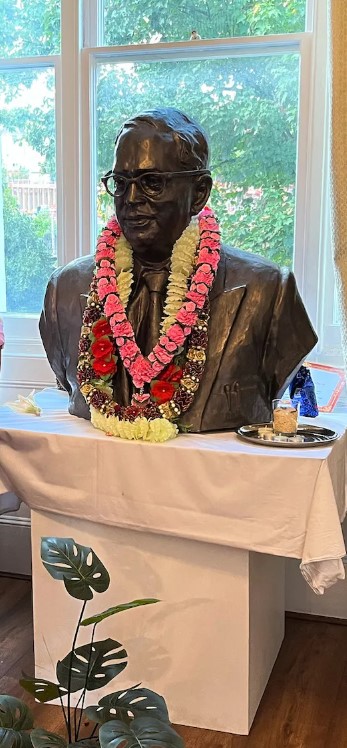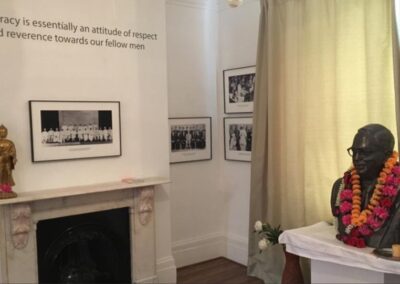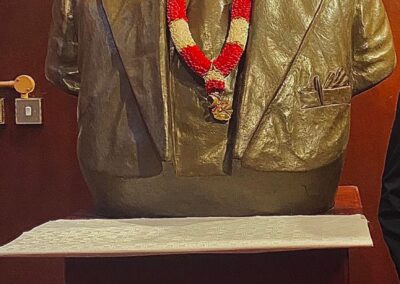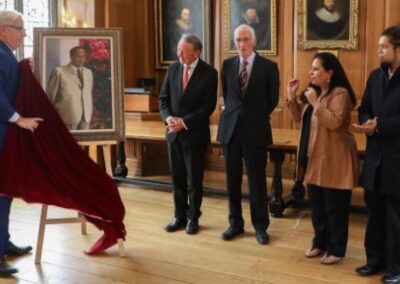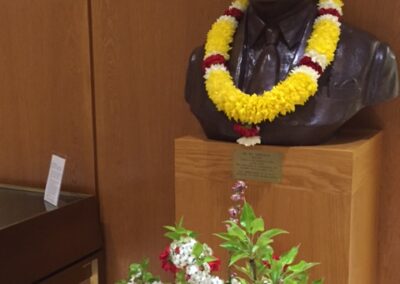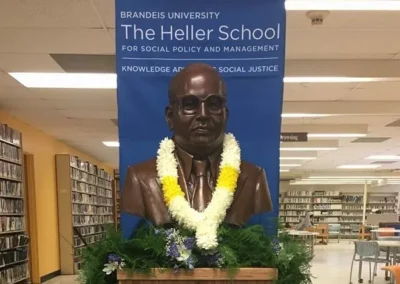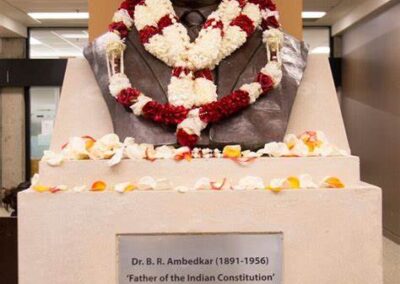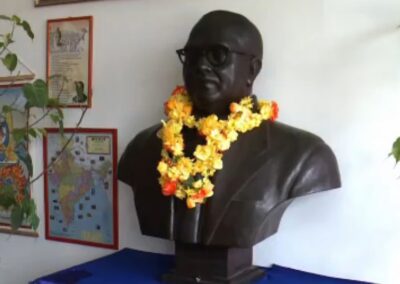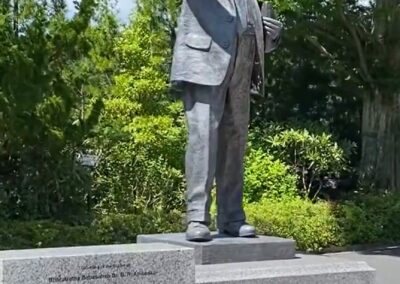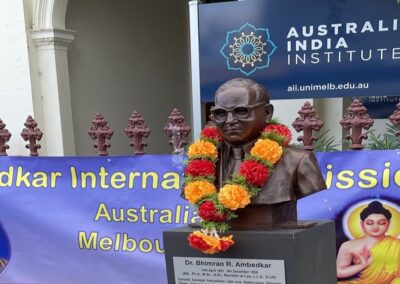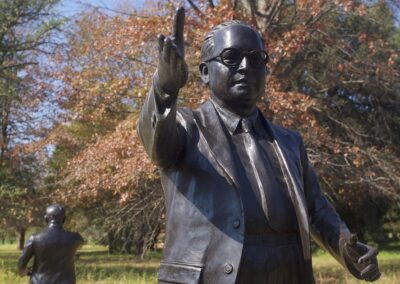Dr. Bhimrao Ramji Ambedkar
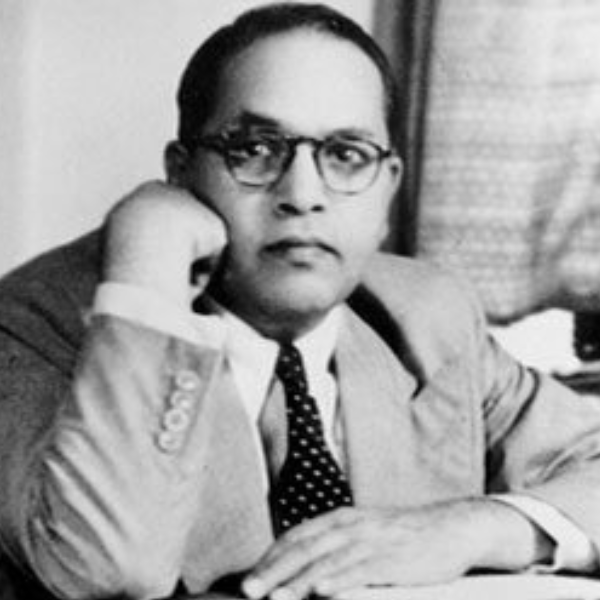
Dr. B. R. Ambedkar : Our source of inspiration
(14 April 1891 – 6 December 1956)
Dr. Bhimrao Ramji Ambedkar, popularly known as Babasaheb Ambedkar, was a visionary leader, an eminent scholar, a social reformer, and the principal architect of the Indian Constitution. His contributions to Indian society have left an indelible mark, particularly in the areas of social justice, human rights, and the upliftment of marginalized communities. His life journey, from being born into a Dalit family to becoming one of the most influential figures in Indian history, continues to inspire millions across the world.
In recent years, Dr. B. R. Ambedkar’s recognition has extended far beyond the borders of India, as his contributions to social justice, equality, and human rights have found resonance in global struggles against discrimination and injustice. His life and work serve as a beacon for marginalized communities worldwide, and his legacy continues to inspire movements for social reform, legal justice, and human dignity. As societies worldwide grapple with issues of inequality, Dr. Ambedkar’s philosophy remains a guiding force for the pursuit of a more just and equitable world.
Early Life and Struggles
Dr. Ambedkar was born on April 14, 1891, in the town of Mhow in Madhya Pradesh, India, to a family from the “untouchable” Mahar caste. His birth in a lower-caste family subjected him to the harsh realities of caste-based discrimination, exclusion, and poverty. During his early years, Ambedkar faced severe prejudice and humiliation from his peers and society at large, which deeply affected him and shaped his determination to challenge the oppressive social system. Despite the severe limitations placed on him due to his caste, Ambedkar excelled in his studies.
Ambedkar’s education was a significant breakthrough in a society that relegated Dalits to the status of social outcasts. He went on to study in some of the most prestigious institutions, earning degrees in law, economics, and political science from institutions like Elphinstone College in Bombay (now Mumbai), the University of London, and the prestigious Columbia University in the United States. His academic achievements were groundbreaking for someone of his background, and he became one of the most learned individuals of his time.
Championing Social Justice
Dr. Ambedkar’s experiences with caste discrimination and social inequality became the driving force behind his relentless pursuit of justice for the oppressed. He firmly believed that social inequality could only be eradicated through the dismantling of the caste system, which he described as a cruel and unjust practice. He began his activism by organizing and leading movements for the rights of Dalits, who were treated as “untouchables” and denied basic human rights.
One of his most significant contributions in this regard was his role in the Mahad Satyagraha of 1927, where he led the struggle for the right of Dalits to drink water from public wells, a privilege that was historically denied to them. His leadership in this movement highlighted his commitment to challenging the deeply entrenched social norms that marginalized Dalits and other lower-caste communities.
Ambedkar’s efforts to secure equal rights for Dalits were not limited to the political sphere. He advocated for the removal of untouchability, the right to education, and access to public facilities for Dalits. He also worked towards the upliftment of women, emphasizing the need for gender equality and social reforms that would allow women to participate in public life and attain independence.
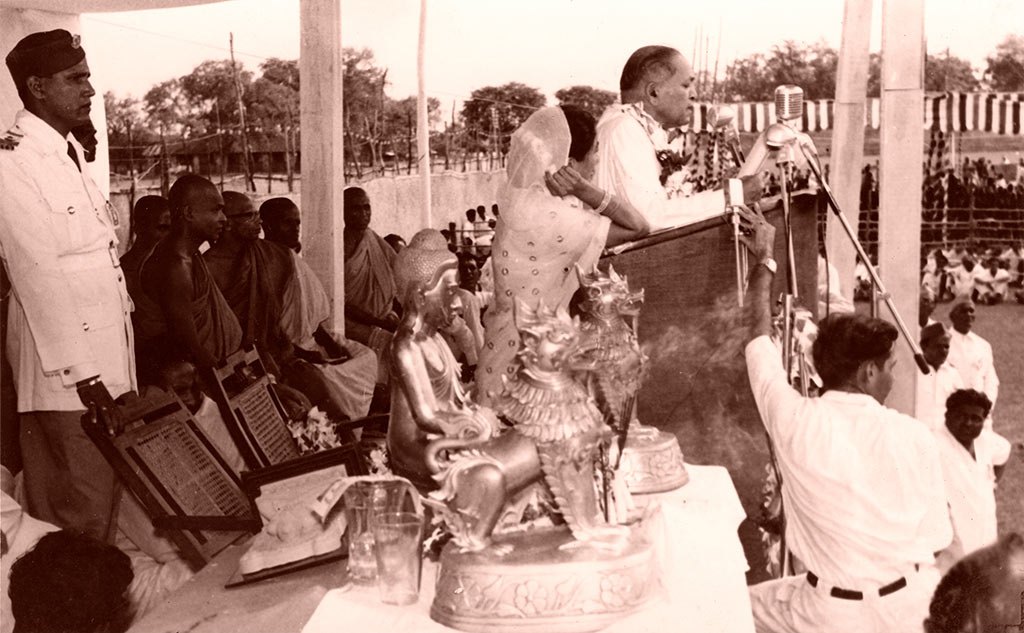
Conversion to Buddhism
One of the most significant and symbolic actions of Ambedkar’s life was his conversion to Buddhism in 1956. This decision was a powerful statement against the caste-based oppression he had faced throughout his life. Ambedkar, along with millions of his followers, embraced Buddhism as a means to escape the chains of the caste system and to promote a message of social justice and equality. He believed that Buddhism, with its emphasis on the principles of equality and non-violence, was the perfect antidote to the oppressive practices of Hinduism, which, according to him, perpetuated caste-based discrimination. His decision inspired millions of Dalits, who saw in his embrace of Buddhism a way to reclaim their dignity and identity.
His conversion to Buddhism and the establishment of a separate Buddhist identity for Dalits led to a new social movement where women, particularly those from marginalized communities, found a sense of empowerment and respect. Buddhist teachings emphasize equality, non-violence, and the dignity of all people, including women. Through Ambedkar’s leadership, many women from Dalit communities found a sense of spiritual and social liberation.
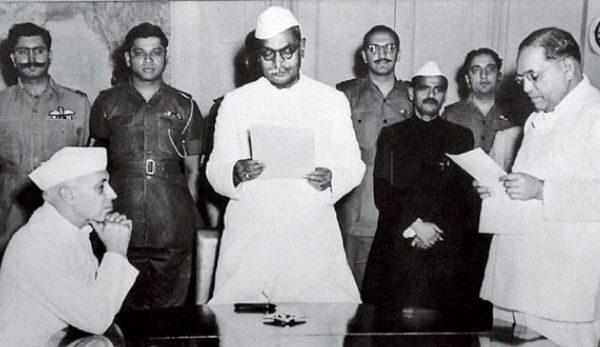
The Making of the Indian Constitution
Dr. Ambedkar’s most enduring legacy is his pivotal role in drafting the Indian Constitution. After India gained independence in 1947, the task of framing a new constitution for the country was undertaken by the Constituent Assembly. Ambedkar, who was appointed as the chairman of the Drafting Committee, took on this monumental responsibility with unwavering dedication. His vision for the Constitution was shaped by his experiences and his commitment to creating a just and egalitarian society.
Ambedkar’s role in the drafting of the Constitution ensured that the document would enshrine the values of equality, justice, and liberty. He was instrumental in incorporating provisions that sought to protect the rights of Dalits, women, and other marginalized communities. Article 15 of the Constitution prohibits discrimination on the grounds of religion, race, caste, sex, or place of birth, while Article 17 abolished untouchability. Ambedkar also advocated for affirmative action policies, such as reservations in education, employment, and political representation, to uplift socially and economically disadvantaged groups.
Global Recognition of His Legacy
Dr. Ambedkar’s life and work have gained recognition not only in India but also in many parts of the world. His advocacy for the rights of marginalized communities and his role in drafting the Indian Constitution have earned him international praise. His ideas about democracy, human rights, and social justice have been celebrated in various global forums and academic circles.
Ambedkar’s vision of a more just and egalitarian society has inspired movements and organizations across the world. His advocacy for the upliftment of Dalits, women, and other oppressed groups resonates with contemporary struggles for social justice globally. His fight against untouchability and caste discrimination has drawn attention from human rights organizations, both in India and worldwide, which recognize his role as one of the foremost social reformers of the 20th century.
The Rise of Ambedkar's Statue and Memorials Globally
Ambedkar’s global recognition is also reflected in the proliferation of statues, memorials, and institutions dedicated to him across the world. In India, his statues and memorials are present in nearly every state, but in recent years, his legacy has also been acknowledged globally. Cities outside of India with significant South Asian populations, including in the United States, the United Kingdom, and Canada, have erected statues of Ambedkar. These statues serve as symbols of resistance against caste discrimination and are often placed in public spaces to inspire people to follow Ambedkar’s ideals of justice, equality, and human rights.
Ambedkar's Role in International Conferences
In recent years, Ambedkar’s ideas have been discussed and celebrated at international conferences and symposiums. For instance, many global forums on human rights, democracy, and social justice now highlight his work, especially in the context of caste discrimination and the struggle for equality. Scholars and activists in countries with marginalized communities often cite Ambedkar’s work as a model for advocating against systemic social injustices.
Notably, Ambedkar’s contributions to the Indian Constitution are often presented as an example of legal frameworks that protect marginalized groups and promote democratic values. His influence has been noted in international academic discussions on the importance of inclusive constitutions, anti-discrimination laws, and affirmative action policies.
Ambedkar as a Global Human Rights Icon
Dr. Ambedkar’s fight for human rights, equality, and justice has also earned him recognition as a global human rights icon. His role in drafting the Indian Constitution, which guarantees fundamental rights to all citizens, is often highlighted in international discussions on human rights. His commitment to the upliftment of women and other oppressed communities, along with his unrelenting battle against untouchability, positions him as a global advocate for human dignity and rights.
The United Nations, through various observances of human rights days, has acknowledged the contributions of Ambedkar to global human rights efforts. His emphasis on social justice has made his work relevant to international discussions on discrimination, equality, and empowerment.
Recognition by Global Leaders and Institutions
In recent years, world leaders and institutions have publicly recognized Ambedkar’s contributions. In India, his legacy is celebrated by political leaders across the spectrum, and his influence on the Indian Constitution is often cited as an example of a model constitution that promotes equality. On the global stage, various countries have recognized Ambedkar’s contributions to legal and social reforms.
For example, in 2015, the United Nations marked the occasion of Dr. Ambedkar’s 124th birth anniversary by hosting a special event that recognized his contributions to human rights and social justice. This global recognition further cemented Ambedkar’s status as a leader not just in India, but on the world stage.
Ambedkar as a Global Human Rights Icon
Dr. Ambedkar’s fight for human rights, equality, and justice has also earned him recognition as a global human rights icon. His role in drafting the Indian Constitution, which guarantees fundamental rights to all citizens, is often highlighted in international discussions on human rights. His commitment to the upliftment of women and other oppressed communities, along with his unrelenting battle against untouchability, positions him as a global advocate for human dignity and rights.
The United Nations, through various observances of human rights days, has acknowledged the contributions of Ambedkar to global human rights efforts. His emphasis on social justice has made his work relevant to international discussions on discrimination, equality, and empowerment.
Click Here to Back Our About Us page

